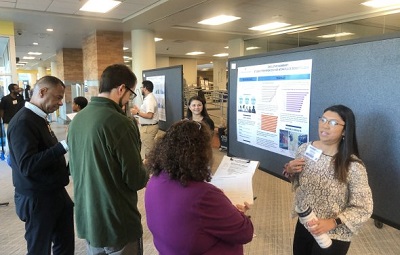Characterization of a Toxin-Antitoxin Locus in Acinetobacter baumannii
Description/Abstract/Artist Statement
Toxin-antitoxin (TA) systems are mechanisms of survival in many species of bacteria. In nontypeable Haemophilus influenzae (NTHi), the type II TA gene pair vapBC-1 encodes the VapB-1 antitoxin protein and the VapC-1 ribonuclease toxin. This locus contributes significantly to NTH’s survival and virulence during infection. Orthologues of vapBC-1 are present in the Gram-negative bacillus Acinetobacter baumannii, a causative agent of nosocomial infections. In this study, we hypothesized that protein homologues of VapB- 1 and VapC-1 in A. baumannii would interact similarly as those in NTHi. We also investigated whether the VapCAb toxin protein had ribonuclease activity and led to growth arrest.
Presentation Type
Event
Disciplines
Biology | Microbiology
Location
Learning Commons @ Perry Library, Conference Room 1310
Start Date
2-13-2016 11:30 AM
End Date
2-13-2016 12:30 PM
Upload File
wf_no
Characterization of a Toxin-Antitoxin Locus in Acinetobacter baumannii
Learning Commons @ Perry Library, Conference Room 1310
Toxin-antitoxin (TA) systems are mechanisms of survival in many species of bacteria. In nontypeable Haemophilus influenzae (NTHi), the type II TA gene pair vapBC-1 encodes the VapB-1 antitoxin protein and the VapC-1 ribonuclease toxin. This locus contributes significantly to NTH’s survival and virulence during infection. Orthologues of vapBC-1 are present in the Gram-negative bacillus Acinetobacter baumannii, a causative agent of nosocomial infections. In this study, we hypothesized that protein homologues of VapB- 1 and VapC-1 in A. baumannii would interact similarly as those in NTHi. We also investigated whether the VapCAb toxin protein had ribonuclease activity and led to growth arrest.



Comments
Faculty Mentor: Dr. Dayle Daines